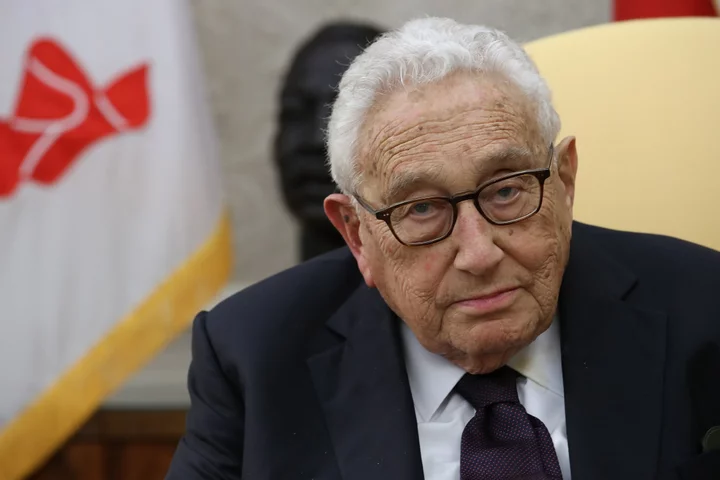Henry Kissinger, who fled the Nazis with his family as a teenager before returning to Germany as a US soldier during World War II, said the political center of gravity in Europe is shifting inexorably toward Berlin, presenting a fresh challenge to the country’s leadership.
Speaking in a June 7 interview with Bloomberg’s Editor-in-Chief John Micklethwait in New York, Kissinger said the quandary for Europe’s heavyweight nation is how best to wield its growing power without alienating its neighbors.
“The leading country has to be an example of moderation and wisdom in balancing the interests of all the countries” in Europe, said Kissinger, who at the height of the Cold War served as US National Security Advisor and then Secretary of State in the Nixon and Ford administrations.
The remarks from the onetime doyen of American foreign policy address a geopolitical dilemma that has gripped Europe since the 19th century over the fate of the continent’s pre-eminent power. The so-called German question raised itself anew in 1989 when the Berlin Wall fell, raising the prospect of a reunited nation becoming by some way Europe’s most populous country and its largest economy.
For that reason, “neither the British nor the French leader were enthusiastic about the unification of Germany” that took place in October 1990, Kissinger said in the interview, a retrospective on his life and career after he recently turned 100.
Germany’s international clout grew after 2005 under Angela Merkel, the first chancellor to grow up in the former East Germany who went on to become the European Union’s longest serving leader. She was awarded the Henry A. Kissinger Prize by the American Academy in 2020.
Yet Berlin has often seemed a reluctant global power, unwilling to match its economic heft with political muscle.
There are signs that reticence may be waning under Chancellor Olaf Scholz, who announced an historic shift in German defense and security policy last year after Russia’s full-scale invasion of Ukraine. Berlin has been a leading supplier of weapons and aid to the government in Kyiv.
Kissinger sees parallels with the situation at the end of the 19th century, when the first German chancellor, Otto von Bismarck, stepped down, putting the newly united country at a crossroads.
The “tragedy” that led to two world wars just a few decades later lay in the failure of Germany to recognize its own “transformation,” he said, adding that “now it is again in this position” but with a leadership that lacks experience of war or totalitarianism.
“We are at this moment now where a new structure of Europe has to be created based on this reality,” Kissinger said. “It’s a new challenge for this generation.”

